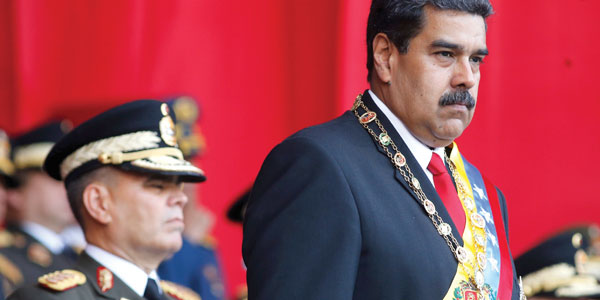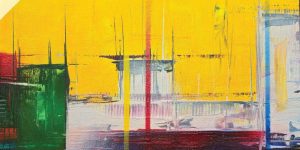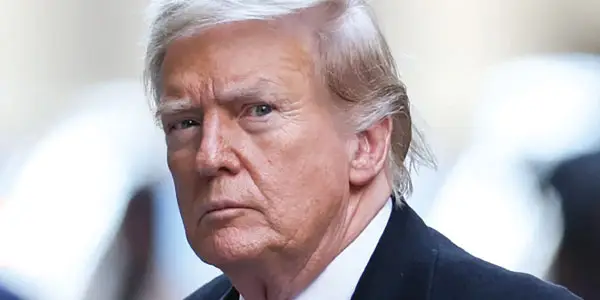
By Jorge Ramos
“If the devil offered me an interview, I’d go to hell.”
— Julio Scherer García, Mexican editor and journalist
I interviewed Venezuelan President Nicolás Maduro in Caracas recently. Unfortunately, it’s quite possible that nobody will ever see the footage. Just 17 minutes into our conversation at the Miraflores presidential palace, Maduro stood up and called the interview off.
“That’s what dictators — not democrats — do,” I said.
A few seconds later, Maduro’s communications minister, Jorge Rodríguez, who had arranged our entry into the country, showed up, claiming that the government had not authorized our interview. He ordered his security agents to seize our four cameras and our other equipment, as well as the memory cards on which the video footage was stored. We were then held at Miraflores for more than two hours.
My producer, María Martínez-Guzmán, and I were taken to a small surveillance room and ordered to hand over our cellphones. We refused. Shortly after that, the lights were shut off and a group of officers came in and forcefully searched us, taking away our phones and my backpack.
The other five Univision journalists in our group were also stripped of their phones. Maduro’s administration was doing whatever it could to prevent us from leaking the interview.
Government officials then demanded that María and I get on a bus, which would supposedly be taking us to our hotel. But we didn’t believe them, and refused to board. Fortunately, by then the news of our detention had started to circulate on social media, thanks to a call María had made to Daniel Coronell, our boss in Miami, before her cellphone was confiscated. Maduro’s agents had taken notice of this, so we were released and allowed to leave in our own car; we headed straight back to our hotel. Later that night, an immigration officer informed us that we would be expelled from the country.
All this just because we had asked hard questions in an interview.
Neither the cameras nor the recorded interview have been returned to us. Only I was given my cellphone back, and all of its contents had been deleted.
The big irony, of course, is that in suppressing our footage so people can’t see Maduro answering questions about being a dictator, the administration only proved that he is one. Yes, the interview was tough, challenging and direct — like all interviews with authoritarian leaders should be. But it would have faded away after one or two news cycles. Instead, by confiscating our equipment, and detaining and deporting us, Maduro’s agents turned the interview (which no one has yet seen) into an international incident — since almost all of the members of my crew were foreign journalists — and showcased the dictatorial nature of the Venezuelan regime.
As I tend to do after any interview with a powerful person, I’ve been thinking hard about whether my team and I could have done things differently. Yet none of us could have imagined that we would face such extreme censorship and brutality. Luckily, no government agent is a match for the resourcefulness of a good journalist, and one of our producers, Claudia Rondón, managed to take accurate notes during the interview of all the questions and answers.
That transcript has been prepared. Here’s a small preview of its contents.
During the interview, I asked Maduro about the rigged elections of 2013 and 2018, and described the accusations against him made by his former intelligence chief, Hugo Carvajal, who says Maduro has “killed hundreds of young people in the streets.” I handed the president a list with the names of 402 political prisoners being held, out of a total of 989 people currently in Venezuelan jails, according to the human rights organization Foro Penal. I showed him the Human Rights Watch report documenting 380 cases of abuse, including torture, committed since 2014. I also showed Maduro footage I had shot the day before, of three young men criticizing him as they sifted through a garbage truck looking for food. At that point, Maduro lost his composure and stopped the interview.
He had agreed to speak to us for 30 to 40 minutes; we only got 17. So there were several important topics we weren’t able to cover. For example, I wanted to ask Maduro about the 46,000 Cubans who are in Venezuela as “an occupation army teaching torture and repression,” according to Luis Almagro, the secretary-general of the Organization of American States. My brave producers, María and Claudia, both of Cuban descent, have assured me that Maduro’s security team included many Cuban agents.
And for my last question, I had wanted to ask Maduro, quoting Chilean President Sebastián Piñera, “Why don’t you leave? Why are you willing to cause so much pain only to hold on to a power that does not belong to you?”
Sadly, I didn’t get the chance.
___________________________________________________________________________
La Entrevista Que (Quizás) Nunca Veas
“Si el diablo me ofrece una entrevista, voy a los infiernos”.
— Julio Scherer
Hace unos días hice una entrevista en Caracas con el gobernante venezolano Nicolás Maduro y, quizás, nadie la pueda ver. Después de 17 minutos de conversación se levantó y dijo que la entrevista había terminado. “Eso es lo que hacen los dictadores”, le dije, “no los demócratas”.
Pocos segundos después se acercó su ministro de comunicaciones, Jorge Rodríguez — con quien habíamos coordinado la entrada al país — y dijo que ellos no habían autorizado esa entrevista. Ahí mismo les ordenó a sus agentes de seguridad que confiscaran nuestras cuatro cámaras, todos los equipos y las tarjetas de memoria donde estaba grabada la entrevista. Luego nos detuvieron en el Palacio de Miraflores durante más de dos horas.
A mí y a la productora María Martínez nos metieron a un pequeño cuarto de vigilancia y nos exigieron que les diéramos nuestros celulares. Nos negamos a hacerlo. Poco después apagaron las luces del cuarto y unos agentes entraron y, por la fuerza, nos requisaron, nos arrancaron los celulares y mi mochila. Los otros cinco periodistas de Univision también fueron despojados de sus teléfonos. Trataban de evitar que se filtrara cualquier versión de la entrevista.
Nos quisieron subir a un camión para llevarnos, según ellos, al hotel. Pero no les creímos. En ese momento — y gracias a una llamada que María pudo hacer a nuestro jefe en Miami, Daniel Coronell, antes que le quitaran el celular — la noticia de nuestra detención empezó a salir en las redes sociales. Y el cambio fue inmediato. Nos liberaron y nos dejaron ir en nuestro propio transporte al hotel. Un funcionario de inmigración nos informó esa misma noche que seríamos deportados del país.
Todo por hacer preguntas duras en una entrevista.
Hasta hoy no nos han regresado las cámaras ni la entrevista. Y sólo a mí me regresaron el celular (con todo el contenido borrado).
La gran ironía es que nos censuraron y nos robaron la entrevista para evitar que Maduro se viera contestando preguntas sobre su papel de dictador y, al hacerlo, quedó demostrado que lo es. Sí, la entrevista fue fuerte, contenciosa, directa. Como, creo, debe ser con cualquier líder autoritario. Y, como todo, seguramente hubiera desaparecido tras un ciclo de noticias o dos. Pero al quitarnos el material y los equipos, detenernos y deportarnos, convirtieron la entrevista (que nadie ha visto) en un incidente internacional — ya que casi todo mi equipo era de periodistas extranjeros — y demostraron el carácter dictatorial del régimen.
Como en toda entrevista con un poderoso, he repensado mucho si debimos haber hecho algo distinto. Pero nunca nos planteamos un escenario de tanta censura y brutalidad. Afortunadamente el ingenio de una periodista libre nunca se puede confiscar y una de las productoras que me acompañó, Claudia Rondón, apuntó fidedignamente todas las preguntas y respuestas de la entrevista.
La transcripción está lista y este es un adelanto. Le pregunté a Maduro sobre los fraudes electorales del 2013 y 2018; le enseñé las acusaciones de su exjefe de inteligencia, Hugo Carvajal: “Has asesinado a cientos de jóvenes en las calles”; le di la lista con los nombres de 402 presos políticos, de un total de 989 que existen en sus cárceles según Foro Penal; le mostré el reporte de Human Rights Watch donde documentan 380 casos de abusos, incluyendo tortura, desde el 2014; y le hice ver un video, que yo filmé, de tres jóvenes comiendo desperdicios de un camión de basura y que lo criticaban. Ahí se rompe Maduro y se va.
Habíamos acordado hablar entre 30 y 40 minutos. Y, claro, quedaron varias preguntas pendientes. Quería preguntarle sobre los 46 mil cubanos que, según Luis Almagro, el secretario general de la Organización de Estados Americanos, están en Venezuela como “una fuerza de ocupación que enseña a torturar y reprimir». Mis valientes productoras, María y Claudia, ambas de origen cubano, me aseguran que en el equipo de seguridad de Maduro había varios agentes de Cuba.
Y para el final, citando una frase del presidente chileno, Sebastián Piñera, tenía esta pregunta para Maduro: “¿Por qué no se va? ¿Por qué causar tanto dolor por aferrarse a un poder que no le pertenece?”
Ya no la pude hacer.









